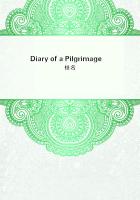I do not speak thus about waltzing because I like to say it;but ye have compelled me. If one member suffers, all the members suffer with it. I respect and revere woman, and Icannot see her destroying or debasing the impalpable fragrance and delicacy of her nature without feeling the shame and shudder in my own heart. Great is my boldness of speech towards you, because great is my glorying of you. Though Ispeak as a fool, yet as a fool receive me. My opinions may be rustic. They are at least honest; and it not be that the first fresh impressions of an unprejudiced and uninfluenced observer are as likely to be natural and correct views as those which are the result of many after-thoughts, long and use, and an experience of multifold fascinations, combined with the original producing cause? My opinions may be wrong, but they will do no harm; the penalty will rest alone on me: while, if they are right, they may serve as a nail or two to be fastened by the masters of assemblies.
O girls, I implore you to believe me! They are not your true friends who would persuade you that you can permit this thing with impunity. It is not they who best know your strength, your power, your possibilities. It is not they who pay you the truest homage. Believe ME, for it is not possible that I can have any but the highest motive. If the evil of foreign customs is to be incorporated into American society, if foul ******* of manners is to defile our pure ******* of life, if the robes of our refinement are to be white only when relieved against the dark background revealed by polluted stage of a corrupt metropolis, on you will fall the burden of the consequences. Believe ME, for your weal and mine are one.
Your glory is my glory. Your degradation is mine. There are honeyed words whose very essence is insult. There are bold and bitter words whose roots lie in the deepest reverence. Beware of the leaven of the Pharisees and of the Sadducees. Beware of the honor which is dishonor.
I hear that the ground is taken that the affairs of Class-Day are not a legitimate subject of public comment; that it is a private matter of the Senior Class, of which one has no more right to speak in print than one has so to speak of a house in Beacon Street to which one might be invited. Is it indeed so?
I have no right to go into Mr. Smith's house in Beacon Street,--I use the term Smith as simply generic, not meaning to imply for a moment that so plebeian a name ever marred a Beacon Street door-plate,--and subsequently print that I was hospitably entreated, or that the chair-covers were faded and the conversation brilliant. Neither have I any right to go into Master Jones's room, in Hollis Hall, and inform the public that he keeps wine in his cigar-box, and that he entertained his friends awkwardly or gracefully. But suppose all the Beacon Street families have a custom of devoting one day of every year to festivities, in which festivities all Boston, and all the friends, and the friends' friends, whom each Beacon Street family chooses to invite, are invited to partake. The Common, and the State-House, and the Music-Hall, &c. are set apart for dancing, the houses are given up to feasting,--and this occurs year after year. Is it a strictly private affair?
I have still no right to denounce or applaud or in any way characterize Mr. Smith's special arrangements; but have I not a right to discuss in the most public manner the general features of the custom? May I not say that I consider feasting a possible danger, and the dancing a certain evil, and assign my reasons for these opinions?
I have spoken of the condition of some of the buildings. Ifind in the College records repeated instances of the College authorities appealing to the public concerning this very thing.
So early as 1651, the Rev. Henry Dunster, President of the College, represented to the Commissioners of the United Colonies the decaying condition of the College buildings, and the necessity of their repair and enlargement: and the Commisioners reply, that they will recommend to the Colonies to give some yearly help, by pecks, half-bushels, and bushels of wheat. Is a subject that is brought before Congress improper to be brought before the public in a magazine?
I have spoken of the banqueting arranged by the Senior Class.













